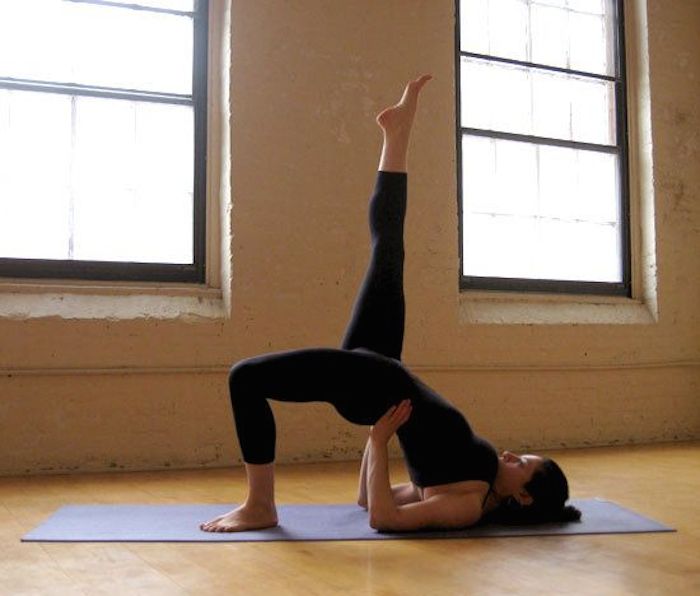
You don’t have to stop your exercise regime once you get a bun in the oven, you just have to tweak it! Here are our first trimester exercise tips!
Why am I pointing to my belly in this 2013 photo from the end of the North Face 100 13km race? Because I was 5 weeks pregnant, and wanted to some day tell my baby that she helped me cross the finish line in second place.
Exercise has pretty much always been a big part of my life, and when I can’t exercise I find that I get stressed and really unhappy. Obviously this was not something I wanted to bring on during pregnancy, so staying fit and active throughout became a huge goal of mine. I think I spent more time reading about exercise than any other pregnancy topic, so here’s a handy list of first trimester exercise do’s and don’ts.
Before I go any further, I want to fully acknowledge that every woman – and every pregnancy – is different. I’ve heard horror stories of debilitating morning sickness, nerve pain, and other conditions that made exercise virtually impossible, and I recognise that luck (and perhaps genetics) played a role in what I was able to do. With all that being said, physical activity can take many forms, and the more you’re able to do, the better!
Exercising in the first trimester can be tough, what with morning sickness, fatigue, tender breasts and all those other super-fun symptoms that herald the start of a pregnancy. But it’s also the last time your body (and belly in particular) will look and feel at least sort of normal – it’s not until midway through the second trimester that most specifically prenatal exercise classes start, so until then, you’re on your own, mama!
Read More: Top 10 Antenatal Classes in Singapore

DO Exercise!
“Mild to moderate exercise during pregnancy is safe and may actually benefit the mother in more ways than one,” says Sassy Mama contributor Dr Taylor Bean. “Studies suggest that the use of exercise in pregnancy may have the following positive effects:
– Less obstetrical complications
– Your time spent in labor may be shortened by up to 1/3
– An enhanced feeling of wellbeing throughout pregnancy
– Decreased perceived exertion during labor
– A decreased incidence of gestational diabetes (which occurs in 3-6% of pregnancies)
DON’T believe old wives’ tales
Once upon a time, women were told that exercise could cause miscarriage, but in the last 10-20 years a slew of studies have shown that not only is that far from true, but in fact exercise has all sorts of positive benefits for babies, including lower, healthier birth weights; more robust cardiovascular systems; and improved cognitive abilities (how cute is that little electrode cap?!).
DO Avoid Overheating

The first trimester is the trickiest trimester, exercise-wise, for a number of reasons. First and foremost, up to 25% of pregnancies can end in miscarriage, and although exercise (and an increased heart rate) don’t cause miscarriage, overheating can be extremely dangerous to a developing fetus.
Says Dr Bean:
“The largest cautions in exercise have to with elevation of the baby’s body temperature (this has caused birth defects in animal models) and compromised blood flow to the baby due to improper body position and stagnancy. There have been reports that the fetal heart rate must match the mother’s heart rate, so an elevated heart rate could be dangerous, but studies on this are conflicting”.
Bottom line: drop the hot Yoga, and avoid steam rooms and saunas. I was never a big fan of running outside in Singapore to begin with, but due to the heat concerns I stayed almost completely on the treadmill during my pregnancy, cranked up the AC in the gym, and majorly upped my water intake. By the way…

DON’T Forget to Drink Extra Water
According to Women’s Health, pregnant women are particularly susceptible to immediate drops in blood sugar (hence all that fun nausea and dizziness). Not only should you always have snacks on hand and be drinking 10-12 glasses of water per day (regardless of exercise), but add at least one additional glass of water per 30 minutes of exercise.
DO Work out in moderation
I was in the midst of training for the North Face Run when I found out I was pregnant, and although I didn’t want to quit cold turkey, I did cut out speed interval workouts, and reduced my training mileage a bit. I took it easy during the race (and lucked out with cool, rainy weather), and for the most part felt great. The timing was actually quite fortuitous, because about 10 days later, the dreaded morning sickness (or in my case, nausea) set in. Once the second trimester rolled around, I actually re-introduced speed intervals (at a lower pace than before) and kept with them right up to around 38 weeks.
Read More: Top Women’s Physios in Singapore
From weeks 7-12, I felt nauseated from about 11am through bedtime. I had to force my dinners down with huge gulps of water (though I was able to keep eating vegetables and lean proteins without any wacky cravings). I never threw up (thanks Mom!), but I certainly didn’t feel great. I made it my goal to exercise 4-5 times per week, and while it was majorly difficult, I think ultimately it helped keep my energy up, as I never found myself falling asleep at work, or passing out at 7pm (as lots of people had warned me about!).

DON’T Introduce a completely new exercise regimen
During weeks 7-12, I cut my running down to once or twice per week (though I was back up to 3-4 times a week by the second trimester!) and instead did low-impact exercises like mat Pilates, riding the stationary bike, and Tracy Anderson DVD. She’s kind of a controversial figure in the fitness world, but counts women like Gwyneth Paltrow and Madonna amongst her devotees. I decided to give it a try and found it perfect for my flagging energy level. It’s a full body workout that requires minimal equipment (I was even able to bring the DVD with me on work trips to exercise in my hotel room) and never risks you overheating.
Other great exercises include swimming, walking, Yoga or riding a stationery bike. (By all means if you’re a regular cyclist continue, but you’ll want to be extra careful about avoiding collisions or falls). It’s also best to not suddenly pick up running, or tennis, or kickboxing if you’ve never done it before.
In summary, Dr Bean says, “You should be able to push yourself just as hard as before pregnancy in this stage, but it would be prudent to avoid strenuous activity and overtraining. Just remember to avoid doing exercises where your core temperature may compromise the baby’s health (including hot Yoga)!
As always, exercise should make you feel good, and never is that more the case than during pregnancy. The bottom line is that you should always listen to your body, and if something doesn’t feel good, simply stop! Maybe you’ll feel better tomorrow, or in a couple weeks, or maybe you’ll just return to it after having your baby. Every body is different, but just about every body will benefit from exercise!
Read More:
Third Trimester Exercise Tips
Best Prenatal Yoga in Singapore
Even Trainers Struggle: Regaining My Fitness After Pregnancy
 View All
View All


 View All
View All


 View All
View All

 View All
View All
 View All
View All


 View All
View All





